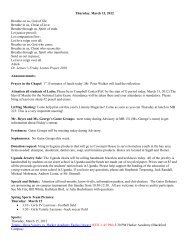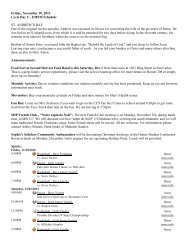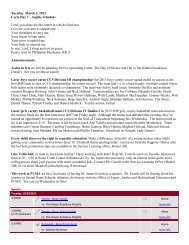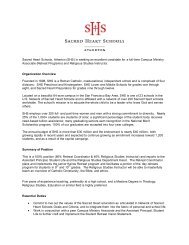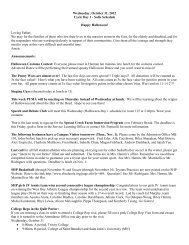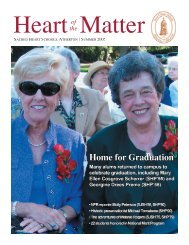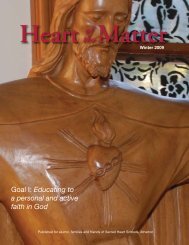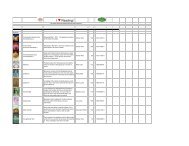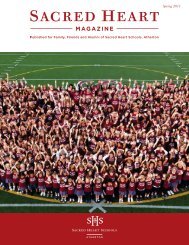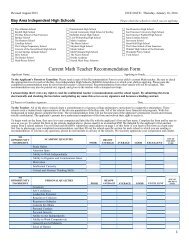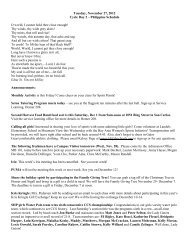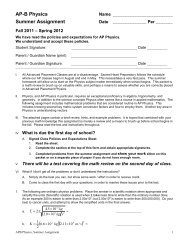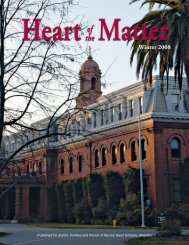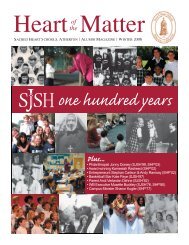Download now (pdf) - Sacred Heart Schools
Download now (pdf) - Sacred Heart Schools
Download now (pdf) - Sacred Heart Schools
- No tags were found...
Create successful ePaper yourself
Turn your PDF publications into a flip-book with our unique Google optimized e-Paper software.
teacher.• Follow the guidelines that are laid out by the teacher and in theinstructional policies.• Respect the educational purpose of each assignment.• Do not plagiarize*, copy work or cheat in any way in coursework,including labs, papers, tests, homework and projects.*Plagiarism is defined as the act of stealing the ideas or words of anotherand passing them off as one’s own. Direct quotes or paraphrased material,which is not common k<strong>now</strong>ledge, must be cited by the use of end-, foot-, orany parenthetical notes. When a student uses anyone else’s words or ideas,the student must ack<strong>now</strong>ledge the source. This applies to ANY borrowings,including but not limited to, borrowings from a published work, from a lecture,from a friend’s old term paper, another student’s homework, the Internet, ora tutor. Failure to ack<strong>now</strong>ledge borrowings is PLAGIARISM—intellectualdishonesty—and a violation of the Honor Code. See consequences that follow.• Be willing not to finish an assignment if one does not understand the work,rather than cheat or copy work to complete the assignment at all costs.• Seek out the teacher first for aid and clarification in all coursework.• Respect teachers, classmates and oneself in light of Goal 2.The issue of academic honesty is academic in nature, yet honesty is paramountin all we do as a community. SHS, in light of our Goals and Criteria, functionsbest when all members of the school community treat each other with fairness,trust and respect.A teacher who witnesses cheating or views a situation where there is theappearance of cheating will first address the issue with the student(s) inquestion. The classroom teacher will, in the process of inquiry, establish whetheror not cheating has occurred.can be defined and documented as academic dishonesty.Reporting Procedures for Violation of the Honor CodeWhen cheating in any form is observed, proven and determined, it directlyimpacts the student’s status in the relevant class.• The teacher will talk with the student(s) involved.• The teacher will report relevant information regarding the specificcircumstances to the appropriate Dean of Studies, who will contact thestudent’s parents/guardians. A discussion will take place between the Deanand the parents/guardians to discuss the consequences for the violation ofthe Honor Code. The Principal will also be informed.• This information will be entered into the student’s temporary file.Consequences for Violation of the Honor CodeAny instance of academic dishonesty has some form of consequence. This isdetermined by the classroom teacher, in consultation with the appropriate Deanof Studies and the Principal.For a first offense, the student will:• Receive no credit for the assignment in question.• Not be allowed to turn in make-up work to restore credit.• Have a meeting, along with her parents/guardians, with the Dean todiscuss the fact that another incident regarding academic dishonesty duringher SHS career will result in a Disciplinary Board review, and that he/shecould face possible dismissal from <strong>Sacred</strong> <strong>Heart</strong>.For a second offense during the remainder of the academic career at<strong>Sacred</strong> <strong>Heart</strong>, the student will:• Face the same consequences as first offense (listed above) AND…• Have the incident forwarded to the Discipline Board and face possibledismissal from <strong>Sacred</strong> <strong>Heart</strong>.The following are examples of academic dishonesty:• Using materials without proper documentation, both printed andBEHAVIORAL EXPECTATIONS AND DISCIPLINEelectronic (i.e., plagiarism).• Using any materials during quizzes/exams which has not been approved byPhilosophythe course instructor (i.e., unauthorized notes cards, study aides)“Self-control is so vital to the conduct of life that no price is too great for the• Talking to another student during a quiz/exam.habit; it is so indispensable that no kind of duty can be well done without it,• Looking at another student’s work during a quiz/exam.and no action is too small in which to practice it. It is a vain expectation to• Allowing a student to copy any portion of an assignment.hope that self-control and unselfishness will come forth at command in a crisis,• Copying an assignment and submitting work of another as your own.when they have not been practiced in the small occurrences of daily life. The• Seeking out or sharing information about exams that have been takenrare crises of life reveal us to ourselves, but we are made in the small victories orpreviously by a different section.defeats of every day.” Janet Erskine Stuart, RSCJ• Storing inappropriate/unauthorized material in any electronic device•32Any other action defined by individual course instructional policies that33



